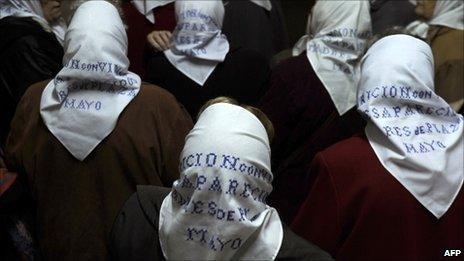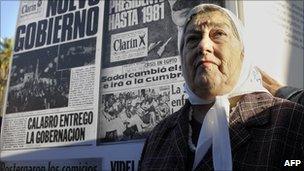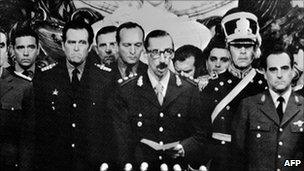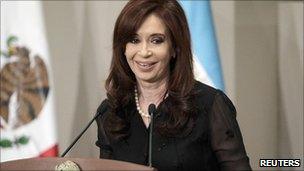Scandal swirls over Argentine Mothers rights group
- Published

The Mothers have campaigned for justice for more than 30 years
For years, the Argentine human rights group, the Mothers of the Plaza de Mayo, has been a potent symbol of the fight for justice.
With their trademark white headscarves, the Mothers march every Thursday afternoon demanding information about the estimated 30,000 people who were kidnapped, tortured and killed during the country's military dictatorship.
But now the Mothers are embroiled in a financial scandal that threatens to also damage the reputation of President Cristina Fernandez de Kirchner, less than five months before the presidential election.
Under investigation is the relationship between the Mothers' controversial leader, Hebe de Bonafini, and her former adviser and right-hand-man, Sergio Schoklender.
Mr Schoklender and his brother came to national attention in 1981, when, in their early 20s, they murdered their parents and were jailed for several years.
The union between the Mothers and Mr Schoklender raised few questions in the past, simply because of the respect and awe in which the human rights group is generally held.
But the issue has now erupted into a full-scale scandal.
Furious
As well as its campaigning work, the Mothers of the Plaza de Mayo builds houses for under-privileged people in a multi-million dollar, government-funded project called Shared Dreams.

Hebe de Bonafini lost two sons and a daughter-in-law during military rule
Sergio Schoklender and his younger brother, Pablo, administered that scheme until Sergio was asked to leave last month in a cloud of controversy over missing funds, unpaid bills and his luxury lifestyle.
The investigations then revealed that Sergio was the major shareholder in Meldorek, the construction company used by the Mothers.
President Fernandez was reported to be livid when the scandal emerged.
Although she has not yet confirmed her candidacy, she is widely expected to stand for re-election in the presidential ballot due in October.
She is the favourite to win and a large part of her popularity is as a result of her campaign for human rights and her close association with the Mothers of the Plaza de Mayo.
The polarised Argentine media, either staunchly pro-Ms Fernandez or vehemently against her, has embraced the case enthusiastically.
Each day there are more details of further alleged improprieties in the building project or more information distancing the president from the scandal.
Opposition politicians have accused the housing foundation of over-pricing its work and are asking searching questions about what happened to millions in public funds.

The 1976 coup heralded an era of repression and human rights abuses
Workers say their pension and social security contributions have not been paid.
The Argentine Central Bank is investigating the signing of cheques worth millions of pesos which never had the funds to cover them.
And the media are questioning Sergio Schoklender's use of a luxury yacht and private planes.
He denies any wrongdoing and says he can justify his earnings and his lifestyle.
Mr Schoklender says he earns royalties from electrical engineering inventions. Extensive media investigations have found no record of anything he has ever registered.
Long fight
The Mothers of the Plaza de Mayo was founded when the military controlled Argentina between 1976 and 1983.
They protested quietly, marching in a circle in the Plaza de Mayo, outside the government palace in Buenos Aires.
They held aloft pictures of their children who had been detained by the authorities, most of them never to be seen again.

President Fernandez has not yet said whether she will run for re-election
They march still. But the Mothers are much older now and the organisation has split into two groups, each with its own, different political objectives.
Hebe de Bonafini, who lost two sons and a daughter-in-law during military rule, is the head of the largest group.
Her branch of the Mothers has a newspaper, a radio station and a university. Their headquarters, near the Argentine Congress, also houses a restaurant and a bookshop.
When the late Nestor Kirchner became president in 2003, he championed human rights and established a close relationship with Mrs Bonafini.
His wife, who succeeded him in 2007, continued that alliance.
Contradictory figure
Sergio and Pablo Schoklender tortured and killed their wealthy parents in 1981. During a lengthy and much-publicised trial, they said they were responding to years of parental abuse but were nonetheless sentenced to life in prison.
Sergio was released, under strict conditions in 1995. Pablo spent eight years on the run in Bolivia, before being jailed. He joined his brother on his release in 2006.
He established a close relationship with Hebe de Bonafini, who called him her "adopted son" and employed him to help administer the Mothers of the Plaza de Mayo finances.
The scandal has also inevitably brought Hebe de Bonafini's own controversial past back into the limelight.
For some, she is untouchable, a national institution worthy of the Nobel Peace Prize. For others she is an embarrassment.
In 2001, she spoke in support of the al-Qaeda attack on the Twin Towers in New York, saying: "I felt there were many people at that moment who were happy and felt the blood of so many in that moment were avenged."
A few years later she said that Pope John Paul II had committed many sins and "was going to hell".
Argentina is waiting for President Fernandez to announce whether she will run in October's election.
Her announcement might now be delayed to allow time for this scandal to blow over and to give her the opportunity to distance herself from an organisation, and its leader, that previously served her very well.
- Published24 March 2011